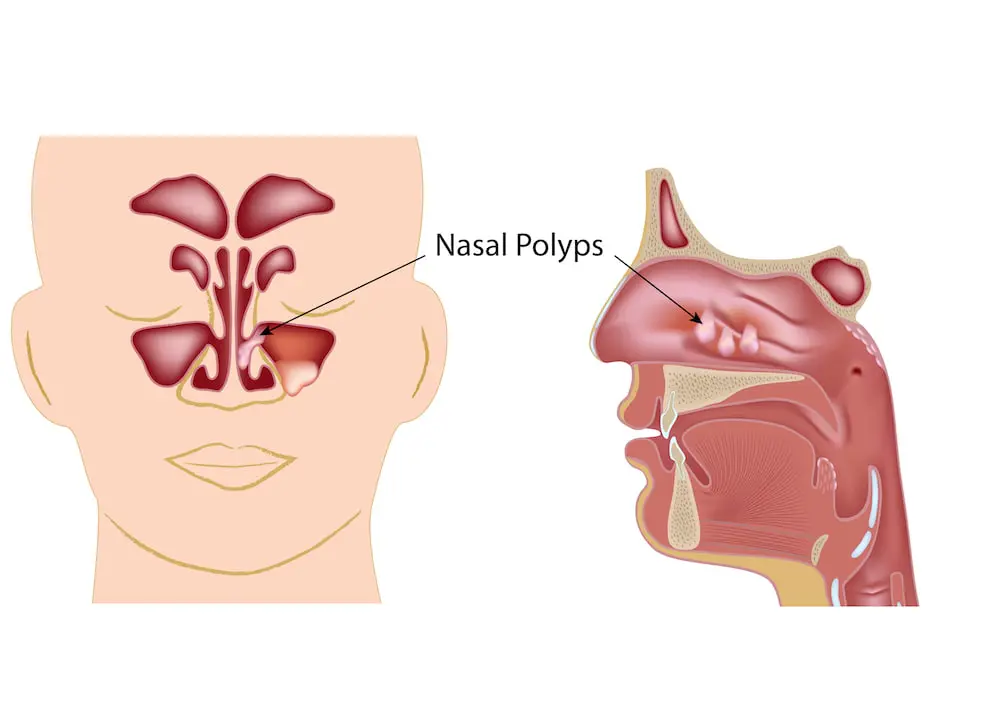Nasal Polyps
Nasal polyps are non-cancerous growths in the sinuses and nasal passages. While nasal polyps are typically painless, large nasal polyps can cause many frustrating and uncomfortable symptoms. Nasal polyps can block the sinuses, cause sinus infections, inhibit breathing function, and affect your sense of smell or taste. If you suspect you have nasal polyps, it is important to get an accurate diagnosis and an effective treatment plan. Houston Nasal Polyp Specialist Dr. Arjuna Kuperan is a Board Certified Otolaryngologist (ENT) and one of the few fellowship certified Rhinologists in Texas. He has the expertise, experience, and skill to help patients in Houston and The Woodlands get relief from nasal polyps.
UNDERSTANDING NASAL POLYPS
The American Academy of Allergy, Asthma & Immunology estimates that 20% of people with chronic sinusitis actually have nasal polyps.1 These inflammatory tissue growths can happen to anyone, although people with environmental/seasonal allergies or asthma are more likely to develop nasal polyps.2 You can have small nasal polyps that do not cause any symptoms, but nasal polyps can grow large enough to create an obstruction. It is important to see an experienced Rhinologist like Dr. Kuperan because not all nasal growths are polyps, and your doctor must differentiate between polyps, nasal cavities, and sinus tumors.
SYMPTOMS OF NASAL POLYPS
- Persistent difficulty breathing through your nose inside the nasal cavity
- Frequent or severe congestions
- Reduced or lost sense of smell or taste
- Frequent post nasal drip
- Sinus pain or facial pressure
- Snoring
- Nosebleeds

TREATING NASAL POLYPS
If you have been previously diagnosed with nasal polyps, or you suspect that you have them, you should consult an experienced Rhinologist. At Houston Advanced Nose & Sinus, Dr. Kuperan can examine your nasal passages with a CT scan (x-ray) of your sinuses or a nasal endoscopy to confirm nasal polyps. He will then create a personalized treatment plan for you. Nasal polyps may be treated with oral steroid medication, which can temporarily reduce their size. Surgical treatment can provide longer-lasting relief, especially if your polyps are very large or resistant to medication.
NASAL POLYP SURGERY
Dr. Kuperan is highly experienced in surgical treatment of nasal polyps. He offers several approaches and can discuss your options with you during your consultation appointment. Typically, he will recommend removal of the nasal polyps in an endoscopic sinus surgery. He finds that opening the sinuses with an endoscopic procedure is more effective than nasal polyp removal on its own because the polyps are less likely to quickly grow back.
Dr. Kuperan’s expertise allows him to achieve complete polyp removal along with a widening of your internal sinus openings. He also offers an advanced technique that utilizes Propel steroid releasing implants to prevent polyp regrowth without the need for excessive oral steroids. Our goal at Houston Advanced Nose & Sinus is to find the best treatment plan for you in order to improve your quality of life.

FREQUENTLY ASKED QUESTIONS ABOUT NASAL POLYPS
Can nasal polyps be treated without surgery?
Yes, mild cases of nasal polyps can be managed with medications such as corticosteroids, nasal sprays, and antihistamines. Lifestyle changes and allergy management may also help. Dr. Kuperan will discuss a range of treatment options with you to find the one that is best suited to your needs.
When is surgery recommended for nasal polyps?
Surgery is usually recommended when nasal polyps are large, causing significant symptoms that do not respond to medications, or if there are complications like sinus infections.
What types of surgical procedures are used for nasal polyps?
Endoscopic sinus surgery (ESS) is a common procedure for nasal polyps. It involves using a thin, flexible tube with a light and camera (endoscope) to remove polyps and open blocked sinuses. Dr. Kuperan is a board-certified surgeon with extensive experience performing endoscopic sinus surgery.
Can nasal polyps be prevented?
While it may not be possible to prevent nasal polyps entirely, managing underlying conditions such as allergies and promptly treating sinus infections can help reduce the risk.
Will nasal polyps come back after surgery?
In some cases, nasal polyps can recur even after surgery although Dr. Kuperan uses advanced surgical techniques to prevent recurrence. Following postoperative care and ongoing management as recommended by Dr. Kuperan can help prevent recurrence.
A Leader in Rhinology
There are countless ENTs in Houston, but only a select few are Fellowship-Trained Rhinologists. Dr. Kuperan’s rare fellowship training in Rhinology places him at the forefront of sinus and nasal care in Houston. His commitment to excellence, evidenced by his innovative surgical techniques and active research, ensures you receive the most advanced treatment available.
References
1 The American Academy of Allergy, Asthma & Immunology. Nasal Polyps. Available: https://www.aaaai.org/conditions-and-treatments/library/allergy-library/nasal-polyps Accessed January 22, 2020
2 Harvard Health Publishing. Nasal Polyps. Available: https://www.health.harvard.edu/a_to_z/nasal-polyps-a-to-z Accessed January 22, 2020
Dr. Arjuna Kuperan has either authored or reviewed and approved this content.
Page Updated:


